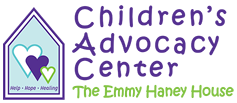
Ways to be a Supportive Caregiver
If your family has already visited the CAC, please reach out to your Family Advocate for specialized resource information.
Parenting a Child after a Traumatic Event:
- Click here for information on parenting a child who has been sexually abused. This guide was made by the U.S. Children’s Bureau. The information is primarily for adoptive or foster parents, but the information is applicable to all caregivers. There is a list by age group of what signs and behaviors to look for in children. It also discusses what is normal, common sexual developmental behaviors for children at different ages. It looks at the impact on the family, what trauma is, and what interventions may be helpful. It discusses types of therapy and where to seek help.
- This is a hub of resources for parents/caregivers. It is from the National Children’s Advocacy Center. It has additional links for information on: Being a Nurturing Parent, Parent-Child Communication, Child Maltreatment Information, Children and Domestic Violence, Coping with Trauma, Handling Stress, Healthy Childhood Sexual Development, LGBTQ+ Youth, Internet/Smart Phones/Social Media Information, Sexual Exploitation, and Prevention Information.
- This is information for parents/caregivers of children who were sexually abused by family members. This is an overview on what feelings you and your child may be having. It also discusses how to address those feelings and ensuring your child that it is not their fault.
- Offers parents and caregivers information about trauma. This fact sheet defines traumatic stress and describes how common it is, how it can impact a family, and things a family can do to cope with traumatic stress.
- Provides parents and caregivers with tools to help them support children who have been victims of sexual abuse, information on the importance of talking to children and youth about body safety, and guidance on how to respond when children disclose sexual abuse. This fact sheet series also includes advice on how to cope with the shock of intrafamilial abuse and with the emotional impact of legal involvement in sexual abuse cases.
- Suggested books for children, teens, and parents/caregivers from the National Children’s Advocacy Center. Suggested books are about sexual abuse and/or about sexual development.
- Child sexual abuse: talking to children 0-11 years. This discusses ways to discuss body safety with young children, provides further reading resources, and tips on how to have hard conversations with your child.
For Parents/Caregivers who experienced Sexual Abuse in childhood:
-
- List of Organizations for Adult Survivors of Abuse from the Child Welfare Information Gateway. They are a part of the U.S. Department of Health and Human Services.
Local Resources:
- Family Justice Center:
- (423) 643-7600
- Services for Domestic Violence victims and survivors
- Partnership for Families, Children and Adults:
- Domestic Violence and Sexual Assualt Crisis Hotline: (423) 755-2700
- Children and Adolescents Mental Health Crisis Response Number:
- 1-866-791-9225
- Metropolitan Ministries:
- (423) 624-9650
- Assistance with Past due utility bills (electricity, gas, water, and sewer), Past due rent payments, Food assistance through an on-site food pantry, and access to other community resources. Look on their website for instructions on when to call.
- Chattanooga Area Food Bank:
- (423) 622-1800
- Look on their website for food pantry information and assistance signing up for SNAP.
- Call 211 to request a voucher for an emergency food box.
- United Way of Greater Chattanooga:
- If you live in Chattanooga and have a 423 area code, dial 2-1-1
- If you live within the 15 counties covered by 211 and do not have a 423 area code, dial 423-265-8000.
- Text your zip code to 898-211 to start a text chat.
- Email us at 211staff@uwchatt.org
- This free, local service is available Monday-Friday 8:00am-5:00pm.
